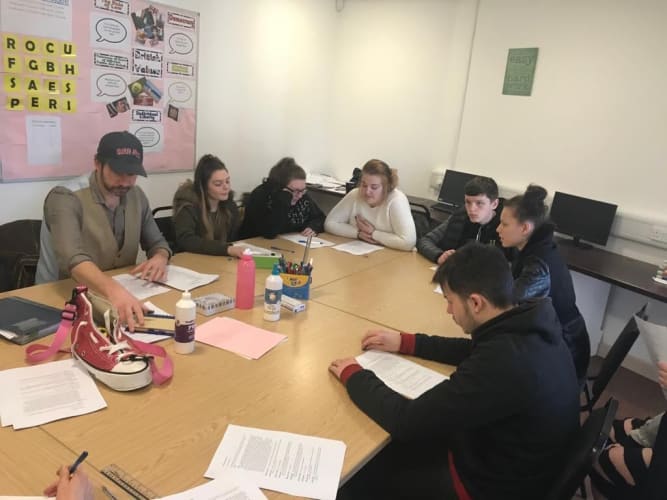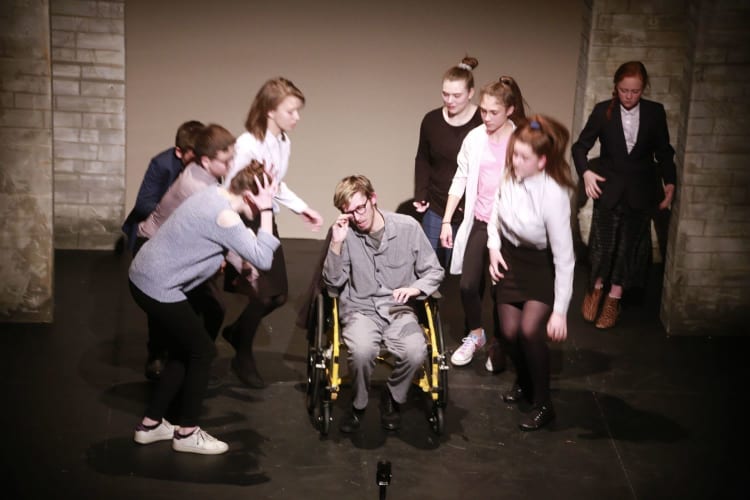Last May, I saw Shooting Fish Theatre Company’s production of The Murderess, a new play by Neil Edwards. It was in all aspects hugely successful. It was everything a thriller should be: gripping, compelling, occasionally funny without descending to camp and with a cracking twist towards the end. The capacity crowd at The Trinity Arts Centre in Gainsborough were as one in their appreciation and enjoyment. And that was that. A really good night out at the theatre. Enough said?
Except it wasn’t as simple as that—not nearly as simple as that. It was something of a unique night at the theatre and one that should interest everyone who works with young people.
Shooting Fish isn’t just a theatre company that produces new work. Their principal purpose is to produce excellent theatre which involves their community as participants, not just audiences. The play The Murderess might have been written by the mighty pen of Neil Edwards but its incarnation, development and realisation were at the hands of a group of young people working closely with the company.
Founded in 2002 by co-artistic director Darren Bolton and now run by Emily Bignell, Shooting Fish Theatre Company is based in Lincoln but works with communities across the region. Historically, much of this region has had low engagement with the arts and it’s refreshing to see a company that actively challenges the status quo in order to draw more people into the theatre. Of course, every company wants to make its work accessible and engaging and many do, but Shooting Fish is both unusual and highly effective in its approach.
The production of The Murderess was part of an overarching initiative called The Literacy Project—now completing its fifth year. The project works with a group of young people called Flare from Community Learning in Partnership in Gainsborough. Many of them are not in full-time education, employment or training and may have specific behavioural or learning needs but the project immerses them in every aspect of producing of a new play. Consequently, there will be sub-groups working on scripting, marketing, designing, directing, auditioning / casting and set building, learning at first hand the complexities and challenges of theatre-making. The process lasts from October until the following May, testing the young people’s commitment but ensuring that their involvement is critical to the success of the project.
A second group—also part of the literacy project—devised, rehearsed and performed their own play called Retrograde—billed as a kind of curtain raiser to The Murderess. In fact, it was a highly intelligent and complex piece of theatre covering such themes as industrial espionage, amnesia and personal loyalty. The young people involved in Retrograde demonstrated their understanding of how to plot and structure a piece of theatre as well as how to play it. The process was facilitated by Martyn Bignell and Georgina Weller.
In The Murderess, the audience witnesses the last confession of a 72-year-old serial killer the night before her execution. I was so impressed by the plausibility of the premise that I was actually quite disappointed to discover that it was a complete work of fiction and not based on a historical case! I take nothing away from the skill of Neil Edwards—a fine playwright—but the intricate and detailed plotting and characterisation was entirely down to the work of the young people.
In conversation with Neil after the play, it was clear that the process isn’t one where the young people simply jot down a few ideas which he then takes away and turns into a play. Meetings between playwright and story-makers are frequent and regular and focused on essential playmaking skills. Neil told me, “we look at classical structure, genre, foreshadowing, exposition and back-story and ask questions such as: what is the play's ‘dramatic question’ and its significant embedded question.” This, it seems to me, is at the heart of the project’s success. Neil and his colleagues understand the vital distinction between making learning accessible and making it easy.
This is rigorous, challenging stuff, but the young people respond positively to it because it ends in a full-blown professional production—not some anodyne and pointless written exam. It’s a perfect example of one of my favourite theories of education: that for young people to learn something valuable, it has to be inconvenient for them not to know it; the challenge for educators is to set up a series of inconveniences. Without those frequent and complex writing sessions, the end product would not have the multifaceted layers it does. They NEED those skills to complete the work in the way they do.
Furthermore, there is no attempt to persuade the young people into taking a different route when they wish to pursue a specific plot line. “An idea involving the use of a doll in a major subplot caused me a few headaches”, laughs Neil, “but I went with it because that was what the group wanted to do”. The idea paid off brilliantly. Left in the hands of a less able writer, it may not have done, but that’s the beauty of the enterprise—the young people work alongside excellent industry professionals. As well as Neil, literacy tutors Martin Kuhl, Sarah Jane Kidd and drama facilitator Emily Bignell serve to help the group to realise their ideas.
Whilst students can take vocational qualifications which shadow the experience of being in a real theatre company, this IS a real theatre company and the work is genuine, relevant and vital. The group is involved in auditioning and casting professional actors, they attend rehearsals and give feedback to the company under the direction of Emily Bignell. They design and build the set under the supervision of Laura Corderey and carry out all the necessary administration with producer Leanne Taylor. All tasks are completed to an exemplary standard—there is absolutely no hint of any ‘damning with faint praise’ that this was a good show considering it was done by a bunch of kids. The production values were as high as any other professional show and, in many instances, higher.
For all its vocational merits, Shooting Fish’s Literacy Project is not about training young people for a life in the theatre. Rather it is an intervention into their lives to build self-esteem, team-working skills and confidence. The child-centred and educational nature of the project means that funds are sourced from non-arts-based organisations including West Lindsey District Council and Children in Need. However, the Arts Council, DJS Arts and The National Lottery also make vital contributions.
One young person, Paige, commented at the completion of the production, “it has really helped with my anxiety; I would not leave the house before sometimes. Being out my comfort zone has been a positive. GCSEs here next year and I would like to be maths teacher”. Another student, Blake, added, “my confidence has improved a lot. I went to Lincoln College to an interview by myself. I have a high chance of getting into GCSE pathway. I would not have done it before this work.”
In recent years, the arts have been in decline in schools for principally two reasons. Firstly, in an act of supreme contempt, the government identified an English Baccalaureate which specifically left out the arts. Secondly, Ofqual demanded the creation of a GCSE in Drama that has a 40% written examination content. Process has, essentially, gone out the window so far as pre-16 qualifications in drama are concerned. As a recently retired drama teacher, I can only hope that the kind of initiative I saw so successfully at work last May from Shooting Fish gains traction in other parts of the country and the good practice spreads.
My only regret was that The Murderess had only two shows—at Trinity Arts Centre in Gainsborough and at Bishop Grosseteste University in Lincoln. Perhaps the next challenge for the Literacy Project would be for the students to organise an Arts Council funded tour?


